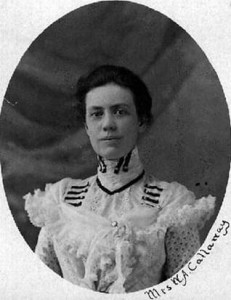
Writing under the pen name of Pauline Periwinkle, Mrs. Callaway coaxed, cajoled, challenged, and urged women of North Texas to improve living conditions in cities and towns. Her prodding brought many changes to the area.
We recently celebrated Mothers’ Day throughout our nation. I would like to honor all mothers in Texas for the fruitful labors they undertook and accomplished in the early 20th century. Even though they had few legal rights, many women set out to change the world for children, not only their own but those whose parents were less fortunate.
Women took on such issues as prohibition, playgrounds, sanitary living conditions, pure foods, and countless other topics we can only imagine existed. Led by Isadore Miner Callaway, the new editor of the Women’s Page for the Dallas Morning News, women of North Texas were encouraged, challenged, and incited to confront a wide variety of unpleasant topics affecting lives at that time. Ironically, Mrs. Callaway had no children.
The first two challenges were prohibition and literacy. Women joined the Women’s Christian Temperance Union (WCTU) and became involved in women’s clubs. While Texas had a local option clause in the 1876 Constitution, women were often the leading force behind those prohibition elections. Most North Texas counties were dry by 1910.
Women’s Clubs of the late 19th and early 20th centuries often focused on literary topics. They might study Shakespeare at every meeting throughout the year. As a result of this love of literature, women’s clubs often organized local libraries with the financial support of the Carnegie Foundation. Pittsburg, Texas was the first community to have a Carnegie Library in the state. Big cities and small towns alike benefitted, all due to the women who saw a need and acted.
Callaway challenged her readers to “be up and doing; to live and be . . . a part of this great, wide, wonderful world.” She wanted to get them out of their comfort zone. Callaway introduced the issue of child labor. The need for city parks, construction of levees to prevent flooding in poor sections of town, and cleaning up railroad right-of-ways found favor with Mrs. Callaway.
Women’s eyes were opened to the unhealthy filth in streets, dust raised by horses and carts, adulterated milk and other foods, and the numerous other critical health issues in both cities and small towns. When there was no tax money to hire a food inspector, women donned white coats and tested milk at local dairies.
Women’s groups were responsible for reform in the juvenile justice system. No longer were youths placed in cells or even in jail areas with adult prisoners. Women employed outside the home secured minimum wage and maximum hour legislation due to the efforts of the Texas Federation of Women’s Clubs (TFWC).
While few if any places outside the major cities tackled all these issues, almost every town with concerned women flourished. So today, you might want to say a big Thank You to the women in your past.
